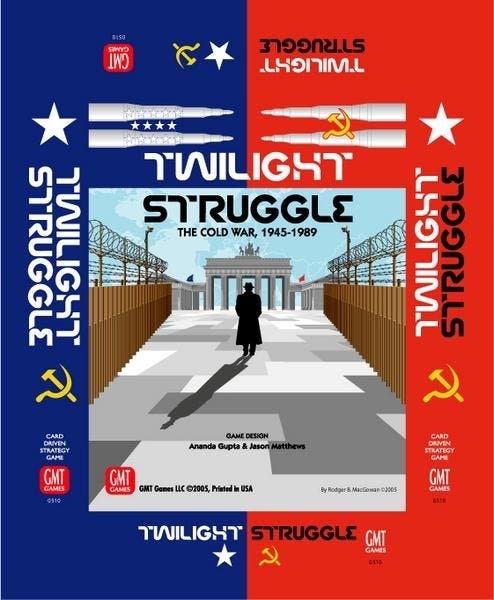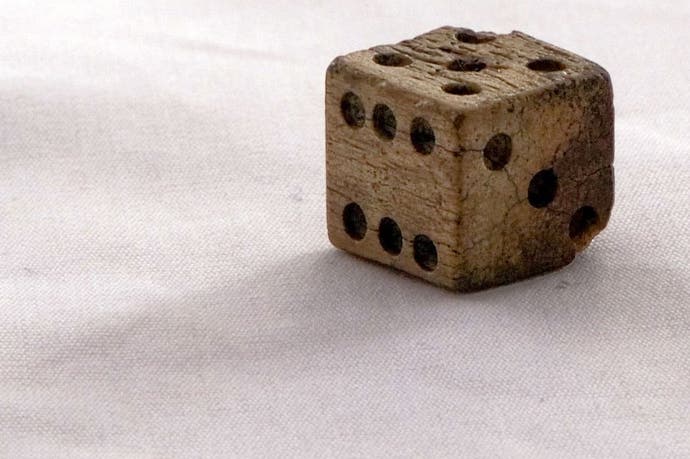The grand strategies of Firaxis
How the Civilization studio often gets physical when it comes to design.
What does a strategy designer think about?
Sometimes, they think about how there are dice rolls and then there are dice rolls. Or rather, how there are games that need a simple touch of randomness to keep everything moving, and then there are games that are trying to go a little deeper with the stuff they're trying to model. I'd never considered this in isolation very much until I met strategy designer Ed Beach, and he told me about something that had initially confused him - and eventually delighted him - regarding a rules choice at the centre of the Great Campaigns of the American Civil War games.
"The series was created by Joe Balkowski," says Beach. "What Balkowski did was he set up a really, really detailed Civil War series, where they have the most period-accurate detail, down to every mile on the hex grid. From Washington DC down to Richmond, Virginia, it's all detailed out for you, with exact replicas taken from 1860s-style maps." But the way the units move across these maps? The march rate of every unit is determined by a die roll. Beach laughs. "You think: Wow, you've got this ridiculously detailed game, and why, if I just roll well, does my unit move six miles, and this guy who rolled poorly only moves one? That's just broken, horribly unrealistic."
Or is it? Let's say you're Robert E. Lee or Ulysses Grant (either way, nice beard), and you want to give one of your units an order. It's the middle of the 19th century and you're in a warzone. You can't phone your soldiers up or even send them a telegram. Instead, you have to write a note.

Seriously. You dictate your instructions to your chief of staff who scribbles it down and then sends a courier up the road. "That order would arrive an hour later at someone else's headquarters," says Beach, a precise man who's clearly perversely delighted by the imprecision of it all. And it only gets worse. "The guy at the headquarters would read it and he's like, 'Hmm, well I'm supposed to march and take this crossroads, but my guys are in the middle of cooking breakfast right now. Do I tell them not to finish breakfast? Do I give them a good meal first?'"
By the time they actually decide how to act, the damage has already been done. The die has been rolled. "The lack of coordination that you had on a Civil War battlefield was just amazingly crazy. That they could have an army of 100,000 men and they were all being driven by these little written orders that were going around the field?" says Beach. "It turns out that a die roll to represent how far a unit moves is actually the perfect way to do it. That's what really brings that series alive."
So what does a strategy designer think about? Last year, I went to Firaxis in Baltimore, Maryland (a place that saw its fair share of generals, and their handwritten notes, back in the 1860s), to get an insight into this question. And, as I sat down with a handful of the studio's developers, I realised that strategy designers spend a lot of time thinking about board games - a lot of time thinking about why a die 6 roll might be the perfect way to simulate troop movement and the chaos of variables that troop movement entails. They certainly spend a lot of time doing this at Firaxis, where pulling games to pieces is as much a part of the culture as it is putting them together.
In truth, given who I was talking to, this was probably not a surprising discovery. At the time I met Beach, he was trying to fix Civilization 5's cultural victory with the glorious Brave New World expansion, but he's also a bit of a hero in tabletop circles, having made card games like Here I Stand, which covers the Reformation, and worked on Balkowski's Civil War series itself. Then there's Jake Solomon, lead designer and programmer on XCOM: Enemy Unknown, who admits that he spends an increasing amount of his spare time downloading the rules to board games he's unlikely to ever actually play. Finally, I was joined by Will Miller and David McDonough, who had just launched strategy title Haunted Hollow on iOS - the evening before our chat, Miller sat through dinner reading early iTunes user reviews - and are now leading development of Civilization: Beyond Earth.

Miller and McDonough are both enthusiastic members of Firaxis' internal board gaming community, too, and McDonough also teaches a course in non-digital game design at the University of Baltimore. I had come to Firaxis to get a clear sense of the people who are now planning out the future of the studio that's synonymous with strategy legend Sid Meier. Board games turned out to be the perfect way of doing that.
These are people who are not shocked by the board game renaissance of the last few years. "I think my compatriots would agree - not just Ed who makes them for real money - that board games have some of the best player experiences around," says McDonough. "They really have a world of their own in providing excellent fun and play, but also really clear and well-executed and elegant design. When I was learning to be a game designer, board games were one of my best inspirations and they still are. I've got quite the board game collection and I'm expanding all the time.
McDonough can't remember how he first got into teaching a course at the University of Baltimore. "It was just kind of on a whim," he tells me. "I thought I would compose a class where all the students studied non-digital games from the simple to the complex. We'd start with Yahtzee, which is one of the dumbest dice games ever made, and go up in complexities through D&D and Magic: The Gathering, and on to some of the other greats of non-digital games. My goal was to expose the students to as many kinds of non-digital games as I can and sort of point them to the similarities between how non-digital games are designed and how digital games are designed. And hopefully build what would amount to the foundations of a game designer's mind."
In every one of McDonough's classes, the students play games and critique them. "Then they take them home and analyse them further," says McDonough, "and finally there's a project where they have to design their own using one of the games in the class. They take a game like Small World or Pandemic and throw out the rules, making new games using the pieces." He shrugs. "It's been a little surprising how little experience they've had with this stuff in the past."
According to McDonough's colleague Miller, without non-digital games - without board games - design students would be missing a huge part of their educations. "I think one of the things that board games are great at is making you think in terms of abstraction a lot more," he argues. "As game designers we deal with this spectrum of abstraction. On one end you have the modern shooter, which is a very literal interpretation of combat. You see through the eyes of your player, everything's very realistic. On the other end you have strategy games, which kind of sit, a lot of the time, on the other end of the spectrum because we're trying to model so much more. The systems we're trying to model are, you know, the history of the world, or the arc of an alien invasion.
"To model that stuff you really have to abstract it in clever ways," he laughs. "And with a board game? You can't make a first-person board game, so you're always dealing with abstractions. It's great for students, because when students come in, they say, 'I want to make a game about this' - and that's generally an idea rather than a design. When you approach video games you can say, 'Oh well, I'm making a shooter, and it's going to be super realistic, and it will have the story and all that stuff.' New designers aren't really thinking in terms of what the necessary abstractions are. When you're designing a board game you have to. Because it's just paper."
Happily, this approach fits neatly with the way Firaxis has always made its games - in part because as a strategy studio, the designers are working with one of the most malleable genres around. "It never starts with genre here," says Miller. "If you were making a game somewhere else it would maybe be, 'Okay we're making a shooter, what's the story of the shooter? What are the things we're going to tack onto the shooter to make it good?' That leads to a pretty narrow, insular kind of development process.
"But here we start with an idea. Sid makes lots of games and brings them in. He's perpetually prototyping things, and it's never like, 'I'm going to make a strategy game today about this.' It's, 'I'm going to make a game today about this.' His mechanical decisions, his abstractions all serve what that idea is. So when he comes in with a new game, that game does not fit into a category a lot of times." Miller nods at Solomon. "I don't think XCOM fits into a category," he says, "and that's why I like it so much. It's very singular. So we try not to stick with the tropes. And it's back to the board games thing - they don't do that either. Board game design is different. There are some mechanical tools, but beyond perhaps the Monopoly board with pieces moving around, there's so much more variety there."
"I'm in awe of board game design," says Solomon. "I am. They work under stricter rules. We can be lazier in digital game design. It's not quite the same challenge, but they do a brilliant job of combining theme and mechanics and it's just really inspiring. Just as a designer, it's thrilling for me to read how they've set up their systems. It's just fascinating."

That's not to say that board game design can necessarily be applied to non-digital games without problems, though. "You have to think laterally," says Solomon. "I'll steal anything as a designer, but I have never had any success looking at a board game's systems and thinking, oh, I can make that work immediately. It's something that's different but in some ways uses the same muscles."
"The biggest difference is: you have to remember what the computer's really good at," agrees Beach. "So the computer's great at keeping things hidden. It's such a pain to have fog of war and hidden units in a board game. You have to have refereed war games where you have one team in one room and they submit their plan to a referee in the middle room. The computer is just perfect for this sort of stuff, though. Whenever you're thinking, 'am I in the board game space or am I in the computer game space?' you have to remember these kinds of things. And the computer is great at little incremental changes that would just be a housekeeping nightmare for the board game - like 10 percent more on a die roll."
"Oh, Fantasy Flight's not afraid. They'll do the 10 percent! Roll the special die!" laughs Solomon. "It's difficult in other ways, too. Because we have to marry theme and mechanics a lot more than games that simulate, one of the things is that there's a renaissance in the social aspects of board games right now. Many times I'll be reading the rules to some game and thinking, wow, that's a brilliant mechanic. Wait a minute! That relies on multiple people interacting, on the tension between telling the truth and not telling the truth. I mean, that's something that board games have and will always have over digital experiences."
Even here though, board games might have a trick to teach designers of all games - including ostensibly single-player games. Take a persistent problem like AI: one of the big, seemingly intractable issues of strategy design. "We give the AI the role of taking the place of a human player against you," says McDonough. "This is something, going back to non-digital games, that they never have a problem with. It's always another human brain on the other side, so you can depend on it to be interesting and unpredictable and have a dynamic level of skill. One of the things that I've always thought was most interesting about AI was that the harder the AI gets, the more it tends to mould the play of the player into the play of a computer. To beat the highest level of AI in Civ, I have to play with such ruthless efficiency and insight that I almost feel I'm not myself anymore. I'm playing as a machine version of me.
"That's just something you never see in non-digital games," he says, "and we might be able to learn from that. There's a lot of social mechanics in non-digital games that make players more themselves: they're wilder and more emotional and unpredictable. They do weird and crazy things. I would love to push AI in this direction - to make it less good and more wild. To make emotional AI that can take on this personality and can throw surprises at players. So the player can feel that they didn't just beat a beautiful machine, but they built this character with whims who reacted to them. Or maybe they pushed it too far and it broke down. They beat a character that feels glee or vindictiveness or something like that. That's kind of a lofty ambition. AI's always going to be subservient to game design, It's always going to be a mechanism to keep players playing and will never approximate another human player, but I would love it if AI was a little wilder - a little more like the AI you get from board games."
If there's a final, crucial thing to take away from board games, of course, it's that good old ideas never really go away. In a week that sees Civilization Revolution 2 hitting touchscreens, that's particularly worth remembering.
"I'm an old school war-gamer," says Beach towards the end of our chat. "That's where I started: hex and counter, war games, big paper maps spread out. I'm not quite old enough to remember when play-by-mail meant writing it down on a piece of paper and putting on a postage stamp, but I have been doing play-by-email gaming for the last 25 years. To me that's a normal way to play a strategy game. It may take three months to finish a game that way, but we're used to that kind of pace.
"And when I started seeing my teenage daughter playing Words with Friends with her high school classmates," laughs Beach, "it suddenly struck me that she's playing in that same mode that I consider the most hardcore, old school gaming mode possible. And now everyone in her generation is used to that and that's just a normal gaming mode for her. The two of them just married up. One is the most old-school way of playing a game possible, and the other is this new brand new wave. It just struck me that there's amazing possibilities for where we can go with games."
This feature was based on a visit to Firaxis Games in Maryland, USA. 2K Games paid for travel and accommodation.



